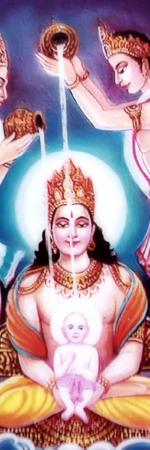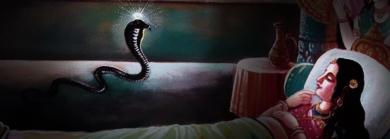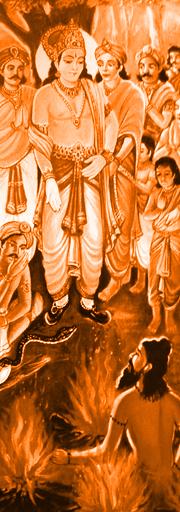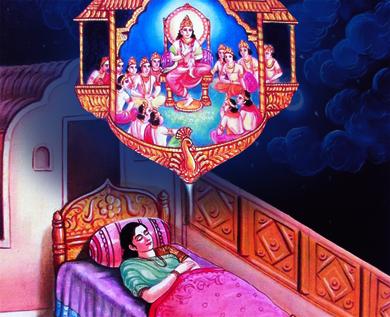Tithi: Paush Dashami
In the city of Varanasi, Asvasena of the Ikshvaku-family was the king there who had a wife named Vama.
On the fourth of the black half of Chaitra, (the moon being) in Visakha, having fallen, at night Shri Parshvanath descended into Queen Vama’s womb. Then she saw the 14 great dreams indicating a Tirthankar’s birth enter her mouth. On describing these dreams to the king, a Tirthankar will be born was interpreted by the Indras, the king and the astrologers, the queen, delighted, passed the time, carrying her embryo. On the tenth of the dark half of Paush, (the moon) in Radha (Visakha), she bore a son, dark blue in color, marked with a serpent, like the ground at the foot of a mountain bearing a jewel. The fifty six Dikkumaris came there instantly and performed the birth-rites of the Arhat and the Arhat’s mother. Sakra (a kind of Indra) came there, gave the queen a sleeping-charm, made an image of the Arhat and put it at her side. He created five forms; with one he took the Lord, with the second he took chauris, and with another the umbrella over the Lord, twirling the thunderbolt with another, his gaze fixed on the Master’s face, he quickly arrived at the rock Atipandukambala on Mount Meru in a moment, seated himself on a lion-throne, and took the Lord on his lap. The 63 Indras, Acyuta and the others, went there quickly and performed the Lord’s birth-bath with grand celebration. After placing the Lord on Isana’s lap, Saudharma’s Indra bathed him with water gushing from the bulls horns. After making the anointing and worship of the Lord of the World, Vasavas, his hands folded respectfully, began a pure hymn of praise.
Stotra
 Homage to you the color of priyangu, the source of kindness to the world, the sole bridge for the crossing of sansar hard to cross. Homage to you Blessed One, sole treasury of the jewels of knowledge, having the color of a blooming blue lotus, sun for the lotuses of bhavyas. Homage to you with the sign of a serpent, with the one thousand and eight favorable marks of a man, moon for dispelling the darkness of karma. Homage to you, purifier of three worlds possessor of three kinds of knowledge, spade for the ground of karma, virtuous. Homage to you, receptacle of all the supernatural powers, possessing unlimited compassion, receptacle of all magnificence, supreme spirit. Homage to you whose passions are far removed, the Ocean of Milk of joy, free from love and hate, on the way to emancipation. If there is fruit from service at your feet, Supreme Lord, then may I have this alone devotion to you in birth after birth.”
Homage to you the color of priyangu, the source of kindness to the world, the sole bridge for the crossing of sansar hard to cross. Homage to you Blessed One, sole treasury of the jewels of knowledge, having the color of a blooming blue lotus, sun for the lotuses of bhavyas. Homage to you with the sign of a serpent, with the one thousand and eight favorable marks of a man, moon for dispelling the darkness of karma. Homage to you, purifier of three worlds possessor of three kinds of knowledge, spade for the ground of karma, virtuous. Homage to you, receptacle of all the supernatural powers, possessing unlimited compassion, receptacle of all magnificence, supreme spirit. Homage to you whose passions are far removed, the Ocean of Milk of joy, free from love and hate, on the way to emancipation. If there is fruit from service at your feet, Supreme Lord, then may I have this alone devotion to you in birth after birth.”
After praising the Arhat thus, he took him and put him down near Vama; and he took away the sleeping-charm and the Arhat’s image.
Childhood
King Asvasena held a grand celebration for his son’s birth. While he was still in the womb, his mother saw a serpent creeping at her side on a dark night and at once told her husband.

Recalling that and deciding, “That was the power of the embryo,” King Asvasena gave his son the name Parshva. Nine cubits tall, he gradually reached youth, a pleasure-grove of love, a charm for (attracting) women, long-armed, the Lord looked like a tree with long branches; and having a broad, firm chest, he looked like an immovable mountain. From his hands, feet, face and eyes, Asvasena’s son had the beautiful appearance of a pool with a bed of blooming lotuses. Marked with the thunderbolt, slender waist, flat-bellied, the Lord had mortise, collar, and pin joints. After seeing the Lord with such beauty, goddesses reflected, “They are blessed on earth, whose husband he will be.”
In the city Kusasthala, King Prasenajit’s daughter, Prabhavati, was infatuated to Prince Parshva. Hearing this news, her parents said, ‘It is a good thing that Prince Parshva, crest-jewel of three worlds, suitable for her, has been chosen as a husband by our; daughter. Our daughter alone is at the head of ambitious women. Such a desire of another girl does not arise anywhere. We shall marry our daughter to Prince Asvaseni.’
King Prasenajit took the proposal to King Asvasena. Prasenajit said, “A request for something hard to obtain alone troubles me now. It will be accomplished by your favor. Take my daughter, Prabhavati, for Prince Parshva from regard for me, king.”
Asvasena said: “Our Prince Parshva has always been disgusted with worldly existence. I do not know what he will do. That desire of ours, too, is always in our heart: ‘When will our son’s marriage festival with a suitable bride take place?’ Now from, affection for you we shall make Parshva marry, even by force, though he has been unwilling from childhood.”
With these words, the king went with him to Parshva and said, “Marry Prasenajit’s daughter.” Sri Parshva said: “Father, possession of wives, etc is a life-saver of the tree of worldly existence even when it is almost destroyed. How can I marry his daughter for undertaking worldly existence? I intend to cross the ocean of worldly existence, completely free of possessions.”
Asvasena said: “Fulfill our wish characterized by marriage with King Prasenajit’s daughter. The ocean of existence must certainly be crossed by you who have such an intention. You should act for your own advantage at the right time, after marrying and having a son.” Parshva was not able to transgress his father’s command and he married Prabhavati to destroy pleasure-karma. At the people’s insistence, the Lord passed the days, sporting with her in gardens, pleasure-peaks, etc.
One day Parshva, occupying the terrace on the top of the palace, began to watch the city Varanasi from curiosity. The Lord saw men and women of the city going outside in haste, carrying baskets of flowers as offerings. Parshva asked his attendants, “What great festival is there today that the people, wearing many ornaments, are seen going in haste?” Someone explained: “Today there is no great festival, but an ascetic, named Kamatha, has come here outside the city. He is observing the penance of five fires. The people of the town go to worship him.” Parshvanatha went with his retinue to see the show; and saw Kamatha engaged in the penance of the five fires. The Lord, who had three kinds of knowledge, saw a great serpent being burned inside a piece of wood which had been thrown into the firepit. When he saw that, he said: “Alas for wrong knowledge! Since even in penance there is wrong knowledge, not compassion. What sort of river is it without water; what sort of night without a moon; what sort of a rainy season without a cloud,; what sort of dharma is it without compassion? How is there dharma of a creature, like an animal, pitiless, not having a trace of the principle of dharma, allowing bodily torments?” Hearing that, Kamatha said: “Rajputs know horses, elephants, etc certainly; but we munis know dharma.” Then the Master ordered his servants: “Pull that piece of wood out of the firepit. Split it open carefully that he may be convinced.” They pulled out the wood, split it carefully, and a very large serpent came out hastily. For the serpent burned somewhat in it the Blessed One had Navkar Mahamantra recited. The serpent, absorbed in meditation, pure-minded, accepted that, watched by the Blessed One with eyes moist from compassion. By the power of the Navkar Mahamantra and the sight of the Master, he became after death a Naga-king, named Dharanendra. ”Oh, the knowledge of the prince! Oh, such discernment!” Being so praised by the people, the Master went to his house. After seeing and hearing that, Kamatha practiced penance especially foolish or pernicious. Whence is there knowledge of persons with wrong belief? After he died, Kamatha became an Asura, named Meghamalin, in the Meghakumaras in the Bhuvanavasins.
The people of the town go to worship him.” Parshvanatha went with his retinue to see the show; and saw Kamatha engaged in the penance of the five fires. The Lord, who had three kinds of knowledge, saw a great serpent being burned inside a piece of wood which had been thrown into the firepit. When he saw that, he said: “Alas for wrong knowledge! Since even in penance there is wrong knowledge, not compassion. What sort of river is it without water; what sort of night without a moon; what sort of a rainy season without a cloud,; what sort of dharma is it without compassion? How is there dharma of a creature, like an animal, pitiless, not having a trace of the principle of dharma, allowing bodily torments?” Hearing that, Kamatha said: “Rajputs know horses, elephants, etc certainly; but we munis know dharma.” Then the Master ordered his servants: “Pull that piece of wood out of the firepit. Split it open carefully that he may be convinced.” They pulled out the wood, split it carefully, and a very large serpent came out hastily. For the serpent burned somewhat in it the Blessed One had Navkar Mahamantra recited. The serpent, absorbed in meditation, pure-minded, accepted that, watched by the Blessed One with eyes moist from compassion. By the power of the Navkar Mahamantra and the sight of the Master, he became after death a Naga-king, named Dharanendra. ”Oh, the knowledge of the prince! Oh, such discernment!” Being so praised by the people, the Master went to his house. After seeing and hearing that, Kamatha practiced penance especially foolish or pernicious. Whence is there knowledge of persons with wrong belief? After he died, Kamatha became an Asura, named Meghamalin, in the Meghakumaras in the Bhuvanavasins.
Reference
1. Kalpasutra Chitrasamput












This is good and more you add janam kalyanak sutra
This is good and more you add janam kalyanak sutra and all kalyanak sutra so we can chant on the day thanks for this also